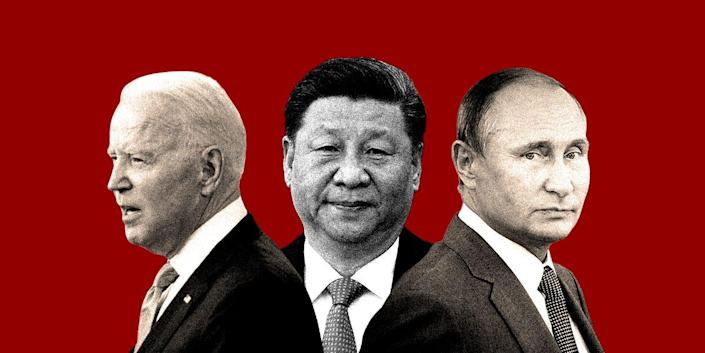
On February 4, as Russian forces on Ukraine’s border were making final preparations for the upcoming invasion, Vladimir Putin and Xi Jinping held a lengthy summit on the sidelines of the Beijing Olympics. It was their first in-person meeting since the beginning of the pandemic. In a joint statement issued later that day, the two leaders did not mention Ukraine by name. But they repeatedly criticized the United States, called for an end to “confrontation between major powers,” and declared that the friendship between their two countries had “no limits.”
The statement appeared to confirm the Biden administration’s worst fears. US analysts have long warned that Russia and China have a common interest in accelerating the shift to a “multipolar world,” in which the US would no longer be the preeminent, unchallenged superpower. Now, with war looming in Ukraine, it looked as though Xi was siding with Putin, like two autocratic supervillains in a James Bond movie, in a bid to undercut the West.
Putin is certainly a popular figure in China, and Beijing’s state-run media have been broadly supportive of him, even as Russia’s military bombs Ukrainian hospitals and slaughters civilians. And there’s no question that Putin needs all the help he can get from China. As Western sanctions continue to cripple Russia’s economy, Putin may be increasingly dependent on exports of raw materials to China — his largest trading partner — as an economic lifeline. What’s more, Western sanctions on Russia’s central bank have left Putin unable to access Russia’s $650 billion in foreign reserves — except for about $132 billion in gold and another $77 billion held by China. If Putin needs more cash — and he will — Xi holds the few remaining purse strings.
China could also aid Russia by expanding its investments into Siberia and Russia’s far east in exchange for timber, oil, and wheat — deals that would circumvent sanctions because they wouldn’t show up on bank ledgers. “In effect, it’s a bartering system,” said Zenel Garcia, an expert on Sino-Russia relations who teaches at the US Army War College. State-backed Chinese companies, he added, had already done similar swaps with Iran. He said that “if push comes to shove” with Russia, he believed “they would do it again.”
So Moscow, increasingly ostracized by the US and EU, would be forced to lean on its “no limits” friendship with Beijing for support. But what about China? Does Xi intend to capitalize on Putin’s war on Ukraine, as some foreign-policy analysts fear, and form a strategic alliance against the West?
It’s true that Xi and Putin have a lot in common. “They both see the West as being in decline,” said Joseph Torigian, a professor at American University and the author for a forthcoming study of Russian and Chinese elites. “They’ve talked about Western aggression as a reason for their own foreign policies. They both have a profound fear — a phobia — of chaos. And they’ve signaled to other elites that they’re not going quietly, that they will fight tooth and nail. Because they think that if they don’t, their states will fall apart.”
But Torigian also highlighted one key difference between the Chinese and Russian leaders. “Xi is a much more cautious individual than Putin is,” he said.
Indeed, a closer look at China’s interests suggests that Xi has a lot to lose from supporting Putin. China may be Russia’s largest trading partner, but Russia’s modest economy — smaller than Italy’s, with a gross domestic product of $1.5 trillion — isn’t enough to rank in China’s top ten. This means that while China may reap some incidental benefits from Russian economic dependence, that dependence only runs one way, from Moscow to Beijing.
In economic terms, China may be far more interested in making sure that Putin’s invasion of Ukraine doesn’t interfere with its much larger trading relationships with the West. For starters, there is a lot more money at stake with the US and Europe — economies with a combined $38 trillion in gross domestic product that trade some $1.4 trillion with China each year. (China-Russia trade is about one-tenth of that amount.) In addition, some of the goods and services that China imports from the West — higher education, scientific equipment, specialized software — aren’t ones that it can find elsewhere.
Offering Russia too much support on the international stage could also undermine China’s long-standing pitch to the global south that it respects the sovereignty of its smaller, militarily weak beneficiaries. Such conflicting aims — more than actual support for Russia — may have been a factor in China’s decision to abstain from joining a UN condemnation of Putin’s invasion of Ukraine. “It’s a very uncomfortable position for them,” said Garcia, the Sino-Russia expert. “I wouldn’t necessarily interpret it as taking Russia’s side.”
During the first few hours of Russia’s invasion, there was also a worry in Washington that Western inaction could embolden China to invade Taiwan. The US doctrine of “strategic ambiguity” means that the US has no firm treaty obligations to Taiwan, and Ukraine could be interpreted as precedent that the US wouldn’t fire a shot in its defense.
But now, with Russia bogged down and its economy reeling from Western sanctions, it looks like Ukraine could serve as a deterrent to China’s ambitions in Taiwan. The Chinese military has less experience and far fewer nuclear weapons than Russia. And while the West is heavily dependent on Chinese labor and manufacturing, it could still freeze as much as one-third of China’s $3.2 trillion in foreign reserves if Xi decided to invade Taiwan. Such post-invasion sanctions could also hamper Xi’s long-term ambition to elevate the renminbi into a global reserve currency — one that would rival the euro and the dollar. “Beijing is looking at how the West sank the Russian economy over the course of a few days and wondering if they’re vulnerable,” Torigian said.
Even before Putin invaded Ukraine, Beijing signaled that it was trying to walk a middle road between Russia and the West. After the Olympics summit, anonymous Chinese officials walked back the “no limits” friendship with Russia, saying it was never intended to commit China to backing the invasion of Ukraine. On February 19, speaking via video at the Munich Security Conference, China’s foreign minister cautioned that “Ukraine should not be a frontline for major party competition.” In a blunt rebuff of Moscow, he added that “the sovereignty, territorial integrity, and independence of any country should be safeguarded.” Nor did he or Xi join Putin two days later in recognizing the so-called “people’s republics” of Donetsk and Luhansk — Russian-occupied land in eastern Ukraine — whose supposed protection served as a pretext for the invasion.
In the end, rather than deepening any alliance between Russia and China, Ukraine may wind up driving a wedge between the US’s two biggest competitors. For Xi, Russia is more of a liability than an asset. “It would certainly be in China’s interest for Russia to wrap the invasion up quickly,” Torigian said. “The reputational and financial risks to China increase the more that time goes on.”
Read the original article on Business Insider




